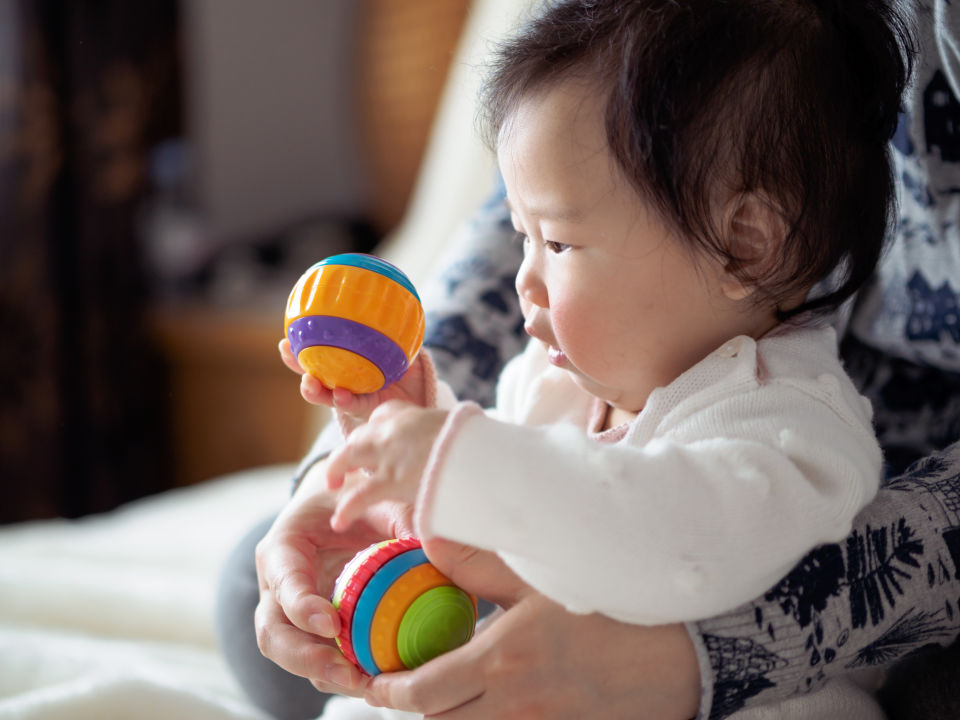Here we debunk common misunderstandings about children’s brain development. Whether you’ve heard or thought about them, read more to find out the facts.

New parents are often flooded with information about child-rearing, and it can become overwhelming to try and keep the facts straight. Luckily, when it comes to your baby’s brain development, the steps are easy to remember – and free. All it takes is a little “brain exercise” – via talking, reading and singing. Do these simple activities early and often to help build connections in the brain that will impact your child’s life forever.
Here we debunk four common myths to help get your baby on the right path for maximum brain development.
The Truth: Playing is learning – and adults are an important part of the fun. When you set your baby down on a blanket or mat for tummy time, get down to his level and play together, one-on-one, face-to-face, by singing songs and pointing out shapes and colors of objects in the room. Young babies are fascinated by faces and are actually watching you pronounce words through your mouth movements. This prepares them for speech. Make up songs about your day or about the objects in the room.
The Truth: Daily experiences and verbal engagement determine how your baby’s brain cells will form and connect to one another. When a baby doesn’t receive simple yet important early experiences – like being spoken to, read to, and sung to early and often – it can have a negative effect on the development of connections in the brain. In fact, studies show that babies who experience more of these types of positive, loving adult-child interactions ultimately possess larger vocabularies, do better in school, graduate from high school, and even have a more successful future.
The Truth: Even though preschool and kindergarten are traditionally seen as the start of a child’s “formal” education, you as a parent are your child’s most important teacher. But luckily, you don’t need a lesson plan to begin teaching your child. Every game of peek-a-boo, as simple as it sounds, can be a learning moment. Books are one of the most effective tools to engage your child in learning, even from infancy. Studies show that encouraging a child’s comments and responses during story time can actually accelerate a two-year-old’s language development by up to nine months. So when you read, ask questions like “Where is the bird?” and “What do you like on this page?” to help further engage your child with the reading. It makes it more fun for you too! Reading is also a powerful bonding activity. When you read with your child, it builds the social-emotional connection between you two.
The Truth: There’s no evidence that pricey “educational” toys make a difference in brain development. In fact, they can often overstimulate a child, which won’t make your child any smarter. While it’s great to have a variety of interesting, colorful playthings at home, the very best “toys” for your baby are you and your voice. Talking, reading, and singing to your child are the most effective activities you can do with your child. They don’t cost a thing – and they don’t take up any space in the toy box! Put your child in a carrier or stroller and take a walk. Point out squirrels, cars, and trees along the way. Sort laundry by colors and make shapes out of folding towels. Clang kitchen utensils together to make “music,” and sing a song as you set the table for dinner. Everyday moments like these are brain-building opportunities.
QUICK TIP: When no longer a newborn, your child is busy learning and engaging in lots of new activities. From sitting up and smiling to crawling and babbling, there is so much fun to have with your child at each stage. And when you’re having fun together, your child is learning and growing with every interaction!






